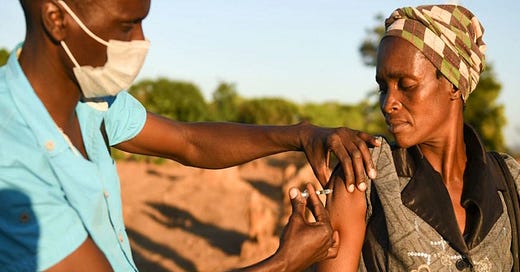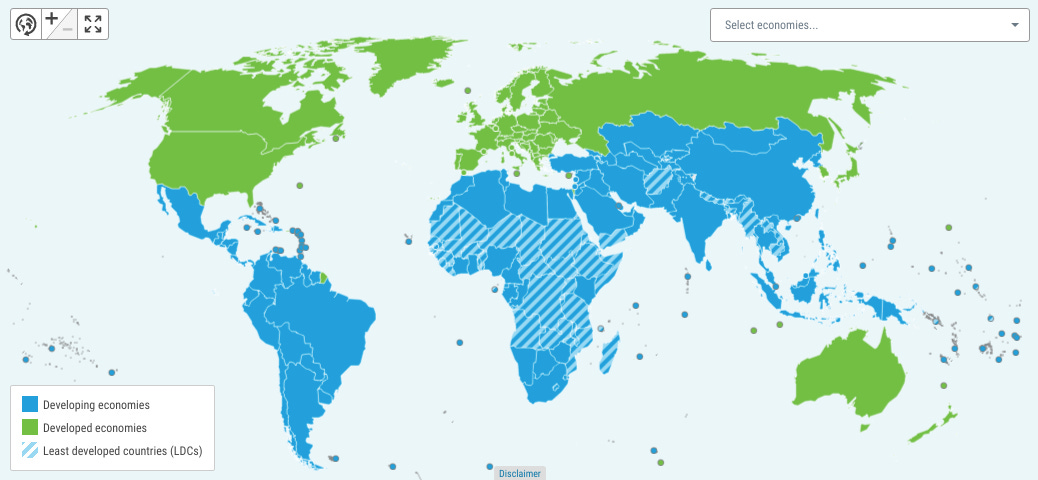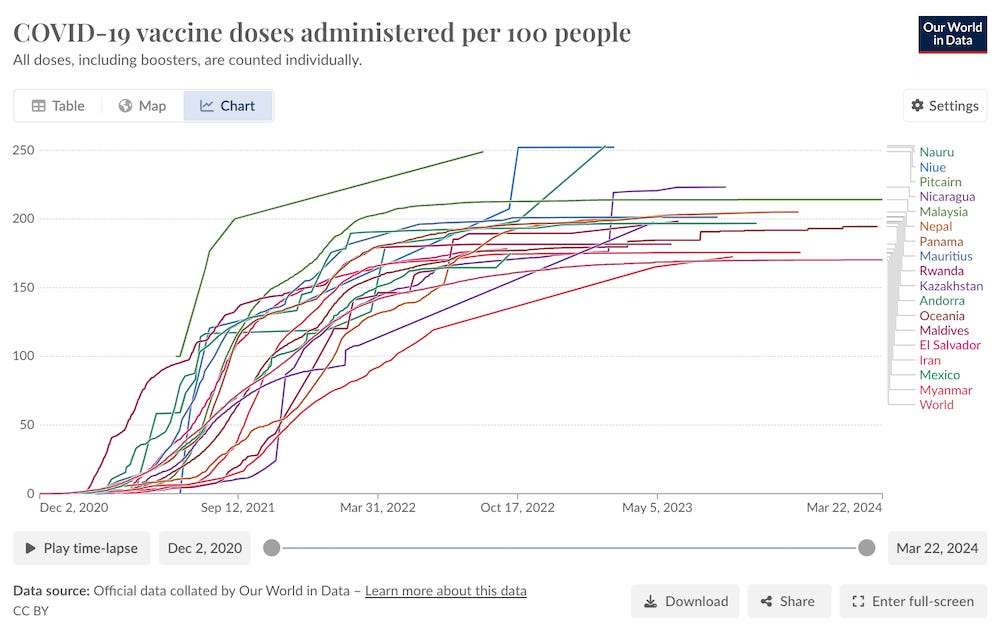Developing Nations Need Our Help
The March 13, 2024 version of the "Pandemic Treaty" seeks to help the developing nations in the "Global South" harm their own people with equitable access to "pandemic-related products." #SARCASM
Was it a warning or a prediction?
EARLY NEXT YEAR: CatastrophicContagion.com
WE CAN DO THIS!
There is less than one week left in the negotiations to conclude the proposed “Pandemic Agreement.”
Please remember: “No one is safe until everyone is safe.”
Act now to help raise awareness of the inequities that have occurred over the past 4 years!
#SARCASM
COVID-19 Deaths:
According to the World Health Organization, at least 6,700,506 total deaths have been attributed to COVID-19, but only 2.6% of those deaths occurred in the WHO’s African region. Clearly, stronger population controls are needed in Africa.
The proposed “Pandemic Agreement” can certainly help improve Africa’s performance by providing equitable access to pandemic-related products.
https://covid19.who.int/ (As of January 6, 2023)
Developed, developing and least developed countries.
https://hbs.unctad.org/classifications/
POOR NATIONS NEED MORE JABS
The world average is 1.7 jabs per person (170.16/100).
The 37 DEVELOPING nations listed in the two graphs below are just some of the nations that received MORE than their equitable share of COVID-19 injections.
Let’s help ensure that they continue to get MORE than their equitable share of jabs in the future!
GRAPH #1:
GRAPH #2:
Billions of people in the “Global South” failed to enjoy the health detriments of equitable access to pandemic-related products over the past 4 years.
Let’s make sure that never happens again!
Below are excerpts from the “Revised draft of the negotiating text of the WHO Pandemic Agreement” from March 13, 2024.
These are just some of the many ways that poor people in wealthy nations can share their tax dollars or increase their national debt in order to help pay wealthy people in poor nations to profit from the mere threat of the next pandemic.
The Parties to the WHO Pandemic Agreement,
Acknowledging that unequal development in different countries in the promotion of health and control of disease, especially communicable disease, is a common danger that requires support through international collaboration, and that pandemic prevention, preparedness and response at all levels and in all sectors, particularly in developing countries, requires predictable, sustainable and sufficient financial, human, logistic and technical resources, (page 2)
Have agreed as follows:
Article 4.2 (page 5)
The Parties shall undertake to cooperate:
(a) in the implementation of the provisions of this Article, in particular through enhancing financial and technical support to developing countries;
Article 5.4 (page 7)
The Parties shall develop and implement or strengthen, as appropriate, bilateral, subregional, regional and other multilateral mechanisms to enhance financial and technical support, assistance and cooperation, in particular in respect of developing countries, in relation to promoting and taking measures towards One Health.
Article 6.3 (page 7)
The Parties commit to cooperate, within means and resources at their disposal, and with the support of the WHO Secretariat and other relevant organizations, in order to provide or facilitate financial, technical and technological support, assistance, capacity-strengthening and cooperation, in particular in respect of developing countries.
Article 9.1 (page 9)
The Parties shall cooperate to build, strengthen and sustain national, regional and international capacities and institutions for research and development, particularly in developing countries, and shall promote scientific collaboration for the rapid sharing of information and access to research results and outcomes, including through open science approaches.
Article 9.2 (page 9)
The Parties shall promote:
(b) technology co-creation and joint venture initiatives that engage the participation of, and international collaboration among, scientists and/or research centres, particularly from developing countries, including from the public and, as appropriate, private sector;
Article 9.2 (page 10)
The Parties shall promote:
(g) access for scientists and researchers, particularly from developing countries, to relevant international scientific research programmes, projects and partnerships, including those referred to in this Article, as well as scientific publications;
Article 10.2 (page 11)
The Parties, in collaboration with WHO and other relevant organizations, shall:
(a) take measures, in cooperation with regional organizations, to provide support, maintain and strengthen production facilities at national and/or regional levels, particularly in developing countries, and to facilitate scaling up of production of pandemic-related products during emergencies, including through promoting and/or incentivizing public and private investment aimed at creating or expanding economically viable manufacturing facilities of relevant health products;
Article 10.2 (page 11)
The Parties, in collaboration with WHO and other relevant organizations, shall:
(d) take measures, and encourage international organizations, to establish long-term contracts and make investments, especially in developing countries’ facilities preferably with a regional scope of operation, to ensure regular production of pandemic-related products produced by local and regional manufacturers;
Article 10.3 (page 11)
Each Party shall promote public and private sector investments aimed at creating or expanding manufacturing facilities for pandemic-related products, especially regional manufacturers based in developing countries.
Article 11.1 (page 11)
In order to enable sufficient, sustainable and geographically-diversified production of pandemic-related products each Party, taking into account its national circumstances, shall:
(a) promote and otherwise facilitate or incentivize the transfer of technology and know-how for both pandemic-related and routine health products, including through the use of licensing and collaboration with regional or global technology transfer partnerships and initiatives, and in particular for the benefit of developing countries and for technologies that have received public funding for their development;
Article 11.1 (page 12)
In order to enable sufficient, sustainable and geographically-diversified production of pandemic-related products each Party, taking into account its national circumstances, shall:
(c) make available licences, on a non-exclusive, worldwide and transparent basis and for the benefit of developing countries, for government-owned pandemic-related products, and shall publish the terms of these licences at the earliest reasonable opportunity and in accordance with national laws; and
Article 11.2 (page 12)
The Parties shall develop and strengthen, as appropriate, mechanisms coordinated by WHO with the participation of other relevant technology transfer mechanisms as well as other relevant organizations, to promote and facilitate the transfer of technology and know-how for pandemic-related products to geographically diverse research and development institutes and manufacturers, particularly in developing countries, through the pooling of knowledge, intellectual property, know-how and data to all developing countries.
Article 13.1 (page 15)
The Global Supply Chain and Logistics Network (the Network) is hereby established. The Network shall be developed, coordinated and convened by WHO in partnership with the Parties and other relevant international and regional stakeholders, and shall be guided by the principles of equity, transparency, inclusivity, timeliness, fairness and consideration of public health needs. The Network shall pay particular attention to the needs of developing countries, including those in fragile and humanitarian settings.
Article 13.2 bis (page 16)
Each Party, in accordance with national laws, shall include provisions in government-funded purchase agreements for pandemic-related products that promote timely and equitable global access to such products, such as provisions that:
(c) incentivize or otherwise encourage licensing and other transfer of technology, in particular for the benefit of developing countries;
Article 19.1 (pages 20-21)
The Parties shall cooperate, directly and/or through relevant regional or international bodies, to sustainably strengthen pandemic prevention, preparedness and response capacities in countries, particularly developing countries, which are Parties to the WHO Pandemic Agreement or the International Health Regulations (2005) (hereinafter referred to collectively as “Cooperating Parties”), taking into account especially the needs of developing countries, while closely coordinating support provided under this Article with the provision of support under the International Health Regulations (2005). Such cooperation shall promote the sharing or transfer of technology and technical, scientific and legal expertise, as well as financial assistance and support for capacity-strengthening to those Cooperating Parties which lack the means and resources to implement the provisions of this Agreement.
Article 19.2 (page 21)
The Parties shall, upon request, facilitate the provision of technical assistance and support for those Cooperating Parties that have requested such assistance or support, in particular developing countries, either bilaterally or through relevant regional and/or international organizations.
Article 19.3 (page 21)
The WHO Secretariat supporting the WHO Pandemic Agreement and the International Health Regulations (2005), following the guidance of the governing bodies, in collaboration, as appropriate, with relevant regional and international organizations and other relevant bodies, shall provide assistance to all countries that so request, particularly developing countries, and organize the technical and financial assistance necessary to address such gaps and needs in implementing the commitments agreed upon under the WHO Pandemic Agreement and the International Health Regulations (2005).
Article 20.1 (page 23)
The Parties commit to working together to strengthen sustainable financing for health emergencies as well as for pandemic prevention, preparedness and response. In this regard, each Party, within the means and resources at its disposal, shall:
(d) encourage governance and operating models of existing financing entities to minimize the burden on countries, offer improved efficiency and coherence at scale, enhance transparency and be responsive to the needs and national priorities of developing countries.
Article 21.2 (page 23)
The Conference of the Parties shall keep under regular review, every three years, the implementation of the WHO Pandemic Agreement and take the decisions necessary to promote its effective implementation. To this end, it shall:
(d) consider and review developed countries’ reports on their contribution to the implementation of the WHO Pandemic Agreement or any other assistance offered towards developing countries and reports submitted by such parties or countries on receiving such offers, their acceptance, rejection or implementation, both submitted pursuant to Article 19 and provide specific recommendations to the parties concerned on enhancing such cooperation and assistance;
The best way to “help” protect people in developing nations from the next pandemic is to ensure that they have equitable access to pandemic-related products.
StopTheWHO.com
RejectTheAmendments.com
StopTheTreaty.org
ExitTheWHO.org
ScrewTheWHO.com
ThePeoplesDeclaration.com
by James Roguski
The old system is crumbling, and we must build its replacement quickly.
If you are fed up with the government, hospital, medical, pharmaceutical, media, industrial complex and would like to help build a holistic alternative to the WHO, then feel free to contact me directly anytime.
JamesRoguski.substack.com/about
JamesRoguski.substack.com/archive
310-619-3055
All content is free to all readers.
All support is deeply appreciated.




















The truth is the light that overcomes the darkness.
We just have to keep piling on the facts to defuse the lies.
Third world country leaders, are the ones who called out the lies, in the beginning.
And some paid the ultimate price.
More and more people are beginning to realise, that continuing to accept the lies, is costing more and more lives.
People will not accept this cost forever.
Targeted public service bodies, will realign to defend themselves and the people.
The devil's horns and tail are revealed in the light.
His pitchfork is not likely to be an adequate defense weapon.
His minions are not likely to be able to hide for long.
Treasonous, treacherous traitors will receive their just rewards.
We shall overcome.
"I'm here to help you," said the Devil with a grin.